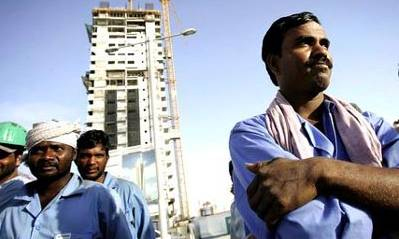
Thiruvananthapuram, Jan 4: A study on migration of Indians to Saudi Arabia says that despite various economic advantages, there is also a social cost that migrants are forced to pay over time for staying away from their kin.
"Remittances from migration potentially improve education and health outcomes for children. However, the opportunity costs of absentee parents make children less likely to receive some essential nutritional inputs, like breastfeeding," says S. Irudaya Rajan of the Centre for Development Studies here.
Irudaya Rajan along with Jolin Joseph authored the study, 'Living and Working Conditions of Low and Semi-Skilled Migrants', commissioned by the ministry of overseas Indian affairs' research unit on international migration.
The most painful and tangible social cost of migration is the separation of children from parents, says the study, adding that the absence of mothers, in particular, results in the breakdown of the traditional care-giving arrangement.
"In the absence of adequate parental guidance, children grow up confused and this may manifest in rebellion, school absenteeism, drop-outs and substance abuse," says Irudaya Rajan.
The study is also part of a book titled: India Migration Report 2012, Social Cost of Migration, which is edited by Irudaya Rajan. The book is likely to be released at the Pravasi Bharatiya Diwas that begins in the Kerala port city of Kochi Monday.
Irudaya Rajan said that the study focuses on Saudi Arabia, which is among the world's principal labour destinations, for its geopolitical importance, the significant size of Indian migrant population, rigid border controls, stringent laws and the way the country treats its immigrants.
"The Saudi economic engine relies heavily on its transient population owing to the low literacy rates and high unemployment rates of its native population. The abundance of capital on one side and the shortage of domestic labour on the other led the mass influx of workers to meet manpower requirements," Irudaya Rajan adds.
According to the annual report of the ministry of overseas Indian affairs, Saudi Arabia continues to be the desired destination among low- and semi-skilled workers from India. The country attracted about 289,297 immigrants from India in 2011.
However, Irudaya Rajan points out that vulnerabilities of the Indian diaspora in Saudi Arabia warrant immediate attention of the Indian government.
"The central question for immigration policy must be the balance between costs and benefits. Human rights apply to all migrants and we must do more to close the gap between rhetorical support for migrant rights and tangible commitments to ensure their well-being.
"The solution lies not only in generating awareness but also in creating viable alternatives. Pragmatic policies are necessary to streamline the migration process and help migrant workers and their families advance on the road to improved life chances," says Irudaya Rajan.






Comments
Add new comment